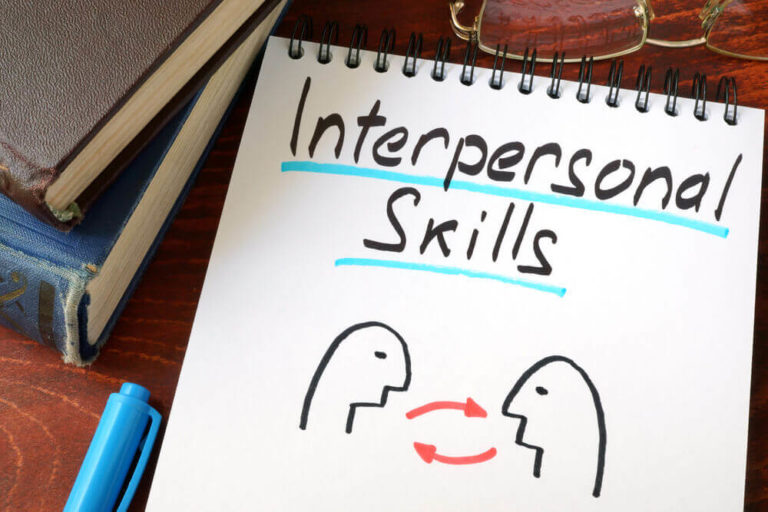Interpersonal skills are also known as soft skills. These skills play an essential role in shaping yourself during all phase of life. This article will help you understand and compare which interpersonal skills are more necessary than others at a specific job or in a particular situation.
Table of Contents
What are interpersonal skills?
Interpersonal skills encompass the qualities and behaviors we demonstrate when engaging with others in face-to-face interactions. These skills, often referred to as “soft skills,” are evident in our body language, verbal and non-verbal communication, and responses to various situations. Despite their fundamental nature, they are pivotal in both professional and personal realms, shaping our success at work and in social and familial contexts.
Underestimating the significance of interpersonal skills can hinder one’s ability to showcase their capabilities to the world. These skills, also known as external skillsets or behaviors, facilitate the expression of inner talents and emotions. Failing to effectively convey these skills can diminish the impact of one’s internal abilities.
Why interpersonal skills matter?

Interpersonal skills are fundamental, and it is also responsible for building up other skills in an individual, tailored to the environment they are operating. Let’s have a look at the importance of interpersonal skills at both home and workplace.
Interpersonal skills at home
As the saying goes, “Practice begins at home”, we inhibit many characteristics by interacting with our family members. Therefore, the roots of interpersonal skills also begin at home. Since your home constructs of family members of different age groups, you would tend to show a diverse mix of interpersonal skills with other members. It is essential because it allows you to understand which skills define you the most and which doesn’t.
Undoubtedly, family is an essential element in our lives, and every family member is vital. Hence, it is crucial for us always to show them respect and keep a good communication inflow to avoid unwanted disputes and hurt anyone’s sentiment.
Therefore, at home, your family would also be able to judge your interpersonal skills and be the harmless first critic. Based on that, you would be able to work on some characteristics or skills that you lack, as mentioned above.
Interpersonal skills at the workplace
Paul J. Meyer
However, to establish a solid relationship with your managers and colleagues, interpersonal skills are essential in building that communication level. A dependable bond between colleagues would help you exchange ideas and create a high level of empathy and trust amongst each other, making the working environment a lot more companionable.
Practical interpersonal skills help establish a rapport between your workmates as well as clients. This rapport is essential as it constructs assurance between both parties and helps each other grow professionally. Some examples include helping each other in a task assigned, giving honest feedback about a project or report completed or even correcting each other’s mistakes.
Technical vs soft skills
Technical skills are skills that an individual has acquired over the years through various training, education, or work experiences. These skills are taught to an individual who has the willingness to purchase them. Technical skills are also classified as hard skills. Some particular examples of technical skills include:
- Data analysis
- Python programming
- Learning a new language
- Learning English for healthcare
- Office Administration skills
- Learning taekwondo
- Learning how to bake
- Graphic design
- Copywriting
- Proessaywriting
These skills mentioned above are not inherited in an individual; instead, we develop these hard skills out of interest, work purposes, or various reasons. Such skills are the ones that you would most likely mention in your CV or resume to increase your chances of getting a job. For example, for a job as an “Accountant’’, one needs to know some accounting software such as QuickBooks and MYOB. For a job as a “Business Analyst”, one needs to have a general idea of Business Data Analysis techniques.
You might be wondering how they differ from soft skills?
Well, Soft skills, also known as interpersonal or communication skills, showcases an individual’s personality, mannerisms and ways of communicating. Unlike technical skill, these skills are not acquired from any training or experiences. Instead, these are already assembled in an individual. Soft skills are also known as transferable skills since they can be helpful for any job position, irrelevant of any training or job-specific expertise. Examples of some specific soft skills are mentioned below.
- Team-work
- Time management
- Conflict resolution
- Critical thinking
- Adaptability to changes
- Confidence
- Relationship building
- Truthfulness
- Exemplary skills
- Leadership skills
In comparison, most employers focus more on soft skills rather than job-specific technical skills. It is because soft skills play an essential role in workplace culture. For instance, if an employee doesn’t know how to use MYOB, he/she can be taught or trained, but if that same employee lacks time management skills, it cannot be taught to him/her by the employer.
Sometimes, both these skills are intertwined. For example, a Marketing Content Writer is expected to know both hard and soft skills such as keywords researching, writing reliable contents, and having time management skills to meet deadlines.
However, a combination of hard skills and soft skills acts as a helping hand for an individual, especially at the workplace, since that individual would be skilled to operate specific software, communicate well with everyone and maintain a healthy work culture.
Types of interpersonal skills
1. Self-Confidence
A perfect amount of self-confidence would always act in your favour. It provides you with the ability to showcase your views and ideas without any hesitation. High self-confidence ensures good presentation skills, public speaking skills as well as leadership skills. Self-confidence plays a massive role in your career development. Employers look at this interpersonal skill quite closely because it demonstrates if an individual can shine in their company and bring them profit.
2. Communication
As mentioned above, “Communication- the human connection- is the key to personal and career success,” However, there are two types of communication skills- Verbal and non-verbal communication.
Verbal communication-
This form of communication is essential, both at work and at home. It helps clear boundaries between people and keeps everything in a very close-knit manner. At the workplace, verbal communication with colleagues and clients would ensure longevity and build a strong bond. This communication can occur in any type of languages or dialects, but the message behind it would always remain the same.
Non-verbal communication-
Your tone of voice, eye contact, body movements, all these are known as a medium for non-verbal communication. The importance of this communication holds the same significance as verbal communication. Sometimes a person can communicate very well verbally, but if you look at them attentively and notice that their hands are sweating or the voice is shaky, it means that the person is nervous.
3. Work Ethic
All employers and recruiters try to look for this characteristic in their employees. If an employee has good work ethics, it generally means that he/she is highly professional. Some of the vital work ethics are:
Professionalism
This represents your attitude towards others, how you communicate with them and maintain good poise. It also means integrity, fairness and truthfulness at the workplace.
Dedication
At the workplace, employees can get distracted easily by focusing on other things apart from work and not prioritising meeting specific work commitments and deadlines. It would prove a low level of dedication for their job and vice versa.
Accountability
Employees who are ethical and honest would always hold themselves accountable for their actions. They will always accept the blame for the mistakes they have committed and apologise for them instead of denying them.
Adaptability
A workplace is likely to go through a lot of changes. Your roles and responsibilities might change all of a sudden, or the person you directly report to might change as well. However, in all these, it is essential to stay calm and be adaptable to these changes.
Productivity
Employees who are productive help generate more revenue for the organisation they are working for. Productive employees are always hard-working and goal-focused.
4. Conflict Management
Conflicts can arise anywhere due to dissimilarities of thoughts and ideas. But how an individual tackle conflict without hurting anyone’s feeling and restore positivity is very crucial. Individuals working in managerial positions usually have to deal with conflicts more. They need to be very assertive, accommodating and empathetic while dealing with disputes.
5. Relationship Management
This is an essential skill as well. Building new relationships at the workplace is utterly different from maintaining them effectively. An individual needs to work on every relationship at the workplace and home to maintain a good working and personal environment around them.
6. Empathy
There is a difference between showing sympathy towards a person and being empathetic towards them. Therefore, being empathic means that you understand their hardships and try to relate to them by imagining yourself in a similar situation and sharing any similar stories if you have any. Empathy can draw people closer at all times and helps you connect with people at an emotional level. On the other hand, being sympathetic only means that you are feeling sorry for the other person.
7. Body Language
This falls under non-verbal communication, as explained above. Eye contact, facial expressions, tone of voice, body movement- all of them defines our body language. Your body communicates while talking verbally or listening to others is crucial since it helps the third person determine how attentive you are or how much confidence is instilled inside you.
8. Leadership
A good leader has a lot of responsibilities towards their followers. Some of the essential duties and responsibilities of a leader are:
- Leaders should always motivate their followers and the people around them to achieve more in life or do something highly commendable.
- They should know how to handle an unexpected situation very well.
- Leaders are responsible for shaping the minds of a group of people and working collaboratively to reach an organisation’s common goals.
- Leaders should be knowledgeable and have a solid personality to make people believe in them and abide by their demands.
- Leaders should always think strategically and focus more on the more significant outcome than worry about the minor issues that might arise in executing a plan.
9. Active listening
It shows how much importance you are giving to the other person and valuing them. While listening to someone speak, you can show some gestures that you are paying attention to, such as nodding your head, smiling in some situations, etc. It is to indicate that you are attentive listening to the other person.
10. Receptiveness to Feedback
Feedbacks can be both positive and negative. Having the receptiveness to listen to feedback and work on yourself is what you need to do. Therefore, one should constructively take all types of feedback.
11. Negotiation
It is a form of discussion in which there is profit underlying for both parties. This interpersonal skill reduces conflict between both parties as well. It can occur between a job seeker and the employee on the salary, a buyer and a seller or a company and its shareholders. Good negotiation skills help an individual or a party to crack a better offer for themselves.
12. Collaboration
Collaboration at the workplace makes teamwork very easy. It helps individuals to brainstorm new ideas effectively and corporate with one another. It also creates more engagement and participation of employees in a specific project or task.
13. Positive Attitude
A positive attitude means that you never lose hope and maintain a positive mindset no matter your circumstances. It helps you always see the brighter side in a situation and see the best in an individual. Positive attitude holders are very optimistic and always have a “can do” attitude.
14. Teamwork
Teamwork is the backbone of any organisation. It increases efficiency in employees and brings out better ideas to solve organization-related problems. Proper teamwork is also responsible for increased collaboration between team members and highly fruitful outcomes for any project.
15. Workplace Etiquette
Some of the important workplace etiquettes are:
- Understanding your work culture– All the employees need to be fully aware of their workplace. Every organisation has a unique set of rule and regulations set by the HR department, and everyone must abide by them. Breaching any organisation rule is considered highly unethical.
- Communication – In a work setting, make sure you always communicate with everyone before making any decision, taking a leave of absence or about any other work-related matters. Leaving a personalised voicemail, replying to emails and messages are some examples of workplace communication.
- Avoid personal conversations– Employees should avoid answering their phone calls and messages frequently during work time. One should not even ask other colleagues about their personal lives and later gossip about it. Such practices are against workplace etiquettes.
How to develop your interpersonal skills?

Interpersonal skills are an essential medium while communicating with people at home and the workplace. Strong interpersonal skills at the workplace will let you excel in your career and work in harmony with your colleagues and managers.
However, even though these skills are a part of your personality and nature, you can develop them with time. Some newbies must be wondering how to develop these skills naturally. Here are some ways:
Identify ideas for improvement-
Get feedback from your friends, family member or colleagues to identify your strengths and weaknesses. Take this feedback as constructive feedback. For example: if people think that your body language or posture isn’t correct, watch videos or tutorials on how to improve it. One can also enhance their interpersonal skills by enrolling in special courses such as Interpersonal skills in Management or Effective Communication skills. You can develop these skills tailored to your current profession or aspiring profession. For instance, if you are working in the healthcare or social service industry, you can learn some interpersonal skills by getting enrolled in a course such as Communication skills in health and social care to advance your career progression.
Focus on your basic communication skills-
People communicate with others unless you live in a cave with no people around you. Therefore, if you try to focus on your communication skills, it would act as the development itself. You, yourself, would be able to figure out which skills are necessary for you and which you lack entirely by comparing your communication skills with others. You will be your judge, and based on your judgement, you can work towards your aspired interpersonal skills.
Improve your more advanced communication skills-
Your advanced communication skills can be strategic or critical thinking, leadership skills, or even client relationship building skills. Such skills are often termed progressive since they develop inside a person with years of expertise and the surroundings they are exposed to for a long time. You can create these advanced skills by observing others who are in a senior position than you. Some specific traits from your manager that you admire a lot: You can try to inhibit yourself by interacting and observing them closely.
Look inwards-
Look into yourself and figure out your future aspirations, the goals you want to achieve in a particular time, and research the interpersonal skills required for you to accomplish all of these.
Use and practice your interpersonal skills in particular situations-
The best way to do this is to make a list of all the interpersonal skills you believe you have in you after all types of observations. You can also use the feedback that others have given you regarding your interpersonal skills. After making a list, practice them thoroughly by putting yourself in different scenarios. For example, at your workplace, while giving a presentation, imagine all the required skills for that particular situation and then practice them on your own.
Reflect on your experience and improve-
People learn from their own experiences. Therefore, if there was any particular situation in which you had to face any difficulty due to a lack of specific interpersonal skill, such as correct eye contact, try to work on it.
Showcase your interpersonal skills

Some people might have a good balance of interpersonal skills but fail to showcase them effectively to the employer, especially during a job interview. Some of the ways to showcase a few very essential interpersonal skills are :
Practical communication skills-
It is essential to effectively convey your message to others to understand you, especially at a job interview. Listen mindfully to the inquiries the employing administrator pose and offer concise and familiar responses. Try not to play down the significance of non-verbal communication abilities also. Keeping up excellent eye content and focusing on your non-verbal communication and motions will go far to guarantee your correspondence is powerful.
Leadership skills-
Even though you might be a newbie and just applying for an entry-level position, your employers would still want to see if you can take charge of any situation.
In such a situation, tell them about the experience where you trained any staff member in your previous job. Even at college or university, if you volunteered for any particular cause and was responsible for team handling or public speaking in any seminars, conferences, etc., make sure you tell them to the hiring manager. These would represent your leadership skills.
Problem-solving skills-
Every employer is eager to know if you can solve problems or overcome any obstacles. You can use a specific technique called “the STAR technique”.
- S = Situation that you were in
- T = Task you were trying to accomplish
- A = Action taken to solve the issue
- R = Results achieved
Confidentiality-
When working for a company, employers expect you to seal all the information about their company and keep it to yourself. An example of showcasing this skill can be explaining how much you value confidentiality and how it aligns with yourself. You can also showcase this skill by giving them a previous reference from the HR department that you haven’t breached any company regulations.
Which jobs require interpersonal skills?
Different jobs require different types of interpersonal skills. However, examples of 5 professions and the interpersonal skills required are:
Customer support-

They are conventionally known as “front line workers” since they have direct face to face or phone communication with customers/clients. These professionals have to deal with customer complaints and queries, product or service knowledge, etc. To be very efficient in their role, they have to have good interpersonal skills such as communication skills, correct body language and eye contact. One can master these skills through years of experience or education, such as a Customer Service Diploma or Customer Service Advisor Course.
Receptionist–

They are the outlook of a company. Their day-to-day tasks include receiving guests, answering phone calls, maintaining data entry, handling essential files and so on. To accomplish all these daily tasks, one needs to have a good set of interpersonal skills such as active listening, verbal and non-verbal communication, empathy, time management, etc. Several courses are provided for professional training on a receptionist role, such as Certificate on Receptionist Skills, Office Admin & Receptionist course, Medical Receptionist Course and many more customised to an industry.
Retail Manager-

They deal with customer complaints as well as handle complaints from team members. They need to have strong leadership, conflict management, team building and collaboration skills. One can become a retail manager after working in retail for a long time. However, to get professional-level training, courses such as the Retail Manager Training Course could be helpful.
Teacher/ Home tutor-

Teachers are required to have high levels of patience and emotional intelligence. They have to maintain a good relationship with the parents and build a comfort zone with their students. Interpersonal skills such as communication, empathy, problem-solving, etc., are also essential in this profession.
Registered nurses-

RN’s are the face and backbone of the healthcare industry. They have to take care of patients from all races and age groups. They need to be very patient and empathetic towards their patients and take care of them with complete diligence. Other interpersonal skills such as communication, body language, active listening, persuasiveness, awareness and critical thinking are crucial.
How to emphasise your interpersonal skills in your resume?

Job-seekers and newbies should include a section in their professional resume on the side, stating, “Interpersonal & technical skills”. It would allow your hiring manager to get to know you more and have a rough idea about your personality.
However, under your “previous experiences’’ or “professional background” section, you can link some interpersonal skills to your previous experiences. Such as:
Experience in handling and communicating with customers with pure diligence and empathy.
- Trained and mentored a team to reach the organisation’s KPI.
- Increased awareness of Corporate Social Responsibility between team members through seminars and presentation.
How to weave interpersonal skills into your cover letter?
Cover letters are an essential part of the job application process. They include all the tailored and job-specific qualities and skills that you possess.
Therefore, in your professional cover letter, include a column dedicated to all the different interpersonal/transferrable skills you possess.
Firstly, identify four or five interpersonal skills that you possess and relate to the job you are applying for. Secondly, try to link those skills to your previous experience. You can use examples as well. Lastly, connect those used examples to the job that you are applying for.
Employers love to read a cover letter that draws a solid connection with relevant examples to the position applied.
How to assess your interpersonal skills?

One can assess their interpersonal skills through various Psychometric tests available online. These tests ask many behavioural questions and assess a person’s mental capabilities based on the answers.
However, some online Personality tests assess your internal traits and skills. These tests involve different situations, and you have to answer accordingly.
Moreover, you can also assess your interpersonal skills manually through feedback received and from your personal and professional experiences.
Closing Note
People who have excellent interpersonal skills are known to be very good with other people, at home and in the workplace. The reason is straightforward. These skills help create a strong bond between one another and essential in reaching certain heights in one’s career.
Although, each human being is unique from one another and therefore contains different sets of interpersonal skills. Most of these skills are in-built within such as empathy, patience and leadership. However, others such as communication, strategic thinking, and problem-solving are skills gained through education and professional experience.
Newbies should have the ability to assess their skills and work on them to get good professional recognition. Therefore, they must highlight their skills and work on improvising them even more.
FAQs
1. What are the types of interpersonal skills?
Interpersonal skills encompass various abilities crucial for effective communication and interaction with others. These skills include empathy, active listening, communication, teamwork, conflict resolution, and leadership. Each of these abilities plays a vital role in building strong relationships, fostering collaboration, and achieving success in professional settings.
2. What are interpersonal skills for students?
Interpersonal skills are crucial for students aspiring to become HR professionals. These skills encompass effective communication, empathy, teamwork, conflict resolution, and active listening. Developing these abilities enhances their capacity to engage with colleagues, understand diverse perspectives, and foster positive workplace relationships.
3. What are the 4 types of interpersonal relationships?
Interpersonal relationships can be categorized into four main types: acquaintanceships, friendships, romantic relationships, and family relationships.
4. How to develop interpersonal skills?
Improving interpersonal skills means enhancing communication, empathy, and understanding with others through active listening, clear expression, and conflict resolution. It involves building strong relationships based on trust and respect, while also developing self-awareness through mindfulness practices.
5. Whats interpersonal skills?
Interpersonal skills refer to the ability to communicate, interact, and collaborate effectively with others in various situations, including the workplace. These skills involve active listening, clear communication, empathy, teamwork, conflict resolution, and building rapport with colleagues and clients. They are essential for fostering positive relationships and creating a conducive work environment.
Further resources
- Essential Laboratory Skills: A Guide for Beginners
- Essential IT Skills that will Get You Hired as an IT Professional
- 10 Hospitality management skills for your successful career
- Employability Skills: A Guide to Skills Employers Look For
- 8 Administrative Office Skills: Employers Are Looking For
- 11 Ways to Improve Your Personal Development Skills
- 10 Medical receptionist skills that will make your resume pro
- Digital Skills: The Ultimate Guide to Grow Your Career
- 22 Practical Skills that Everyone Should Learn in 2023
- 20 Must-Have Excel Skills for Professionals in 2023
- 15 Sales assistant skills that every sales representative should have
- 21 Basic Computer Skills You Must Have in 2023








 June 05, 2023
June 05, 2023

















